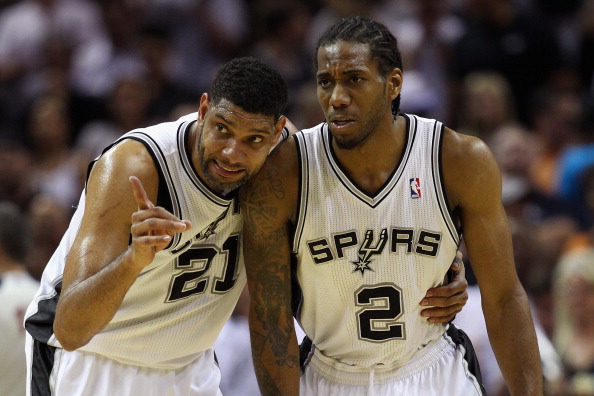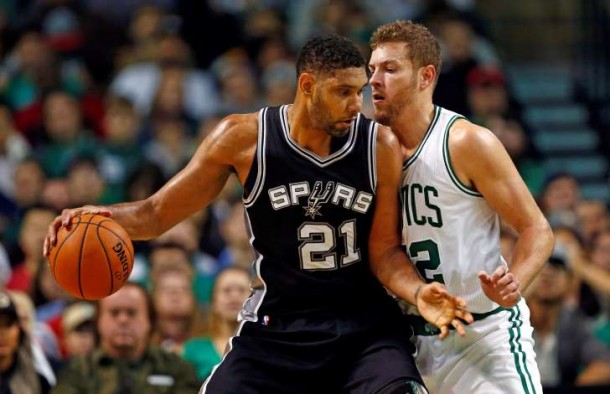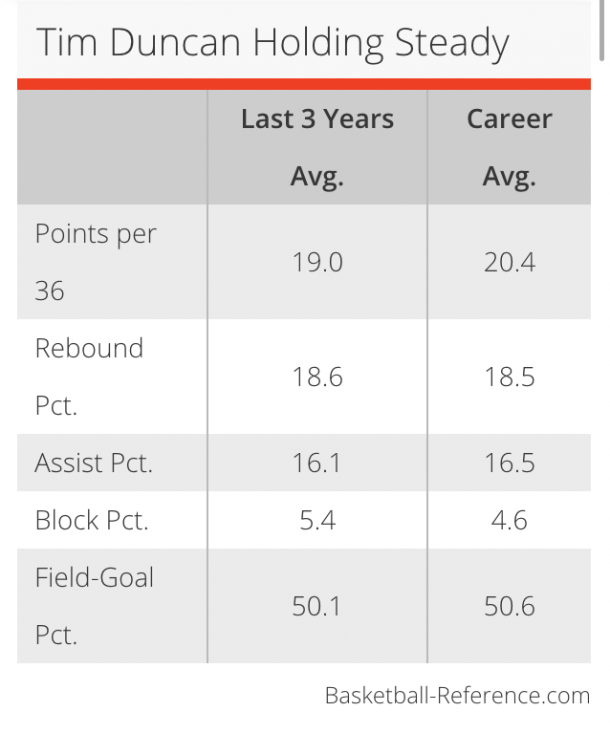Timothy Theodore Duncan strolls through the tunnels of the American Airlines Arena. A lemon button-down tucks into his light blue jeans, and a backpack strap drapes over his left shoulder. Game 4 of the 2014 NBA Finals awaits, and the San Antonio Spurs are looking to go up 3-1 in their series with the Miami Heat.
Though he quips with his teammates, who are undoubtedly laughing at his fatherly pregame garb, Duncan knows what’s at stake—how pivotal his next few hours in South Beach will be, how badly his team needs a win on this hot June night.
As it turns out, the Spurs didn’t just get the win they so desperately needed. They flattened the Heat, viciously pounding them into the yellow and red of their home paint—swirling the American Airlines Arena into a tornado of head-spinning ball movement, a cracked court broken by three after three. In his 31 minutes of Game 4, Tim Duncan put up 10 points, 11 rebounds, and a plus-21 differential. It’s a vintage performance of Duncan’s final years—muted and subtle, yet crucial as ever.
Duncan’s Game 4 is truly a microcosm of his basketball career. His unassuming ways have always seemed to overshadow his on-court prowess. People call him boring, bland, and lackluster in the ways of an NBA star. He’s not flashy enough, not brazen, not bold, and not entertaining enough to be brutally worshipped by the masses of young NBA fans.
Yet, while this all may bode true, Tim Duncan remains the best player of his generation, and one of the greatest big men to ever grace the hardwood.
Born and raised in the tiny town of Christiansted, Saint Croix, Tim Duncan grew up with the dream of becoming an Olympic-level swimmer. But after the destruction of Saint Croix’s only Olympic-size pool during 1989’s Hurricane Hugo, and his lack of enthusiasm for swimming in the ocean, Duncan became inspired by his brother-in-law to switch over to basketball at age 14. Tall and a true student of the game, Duncan would eventually twirl his basketball game into something beautiful; he averaged 25 points per game as a high school senior, and was recruited to play ball with the Wake Forest Deamon Decons.
In the ACC, Timmy was phenomenal. He improved each season, eventually averaging 21 points, 15 rebounds, 3 assists, and 3 blocks per game in his senior year. Duncan was stoic and fundamental, yet as powerful and jaw-dropping as any big man could be. He wouldn’t shout to the heavens after each block, or scream in agony after being called for a foul, but Tim would sometimes showcase his youth, wildly pumping his fist after banking in a jumper.
It was the beginning of what would become a sparkling career—a voyage through the thicket of the NBA’s Western Conference, a winding road where Tim would become the affectionate Old Man Riverwalk, smiling his way through his Texas sized city. After being drafted #1 overall in 1997, Duncan displayed the attitude that made him such a treat at Wake Forest. And in his early years in San Antonio, Duncan fell under the remarkable tutelage of David Robinson, a professional mirror of the youthful Tim. Robinson showed Duncan how to dominate down low, how to smash through the post, and how to throw down a dunk on one end only to coolly run back on defense after. Duncan wasn’t just calm and collective—he was calm, collective, and ruthless. Averaging 22 points, 12 rebounds, 3 assists, and 2.5 blocks in his first three seasons, Tim was becoming a monumental force in the NBA, and the towering building block the Spurs needed.
We’ve all seen him play—everyone knows how precise, scrupulous, and determined he’s been his whole career. But, what happens when Tim Duncan moves on? What happens to the Spurs? What happens to the NBA? Where will Duncan’s dot fall on basketball’s spectrum of greatness?
In the midst of his 19th season, the end of Tim Duncan seems a few stone’s throws away. After the Spurs signed LaMarcus Aldridge last summer, San Antonio’s post-Duncan vision came into focus. Aldridge has taken some heat off Tim, as the 39-year-old’s numbers and minutes have shrunk decently, but the Spurs just don’t seem like themselves when Duncan lounges on the bench. And there’s a reason for that. Check out these stats from a Bleacher Report article.
Timmy isn’t a shadow of his younger self. He’s a clone. Even in 2015-16, a season where Duncan is averaging just 9 PPG, San Antonio has an offensive rating 5.2 points higher with him on the court. In last year’s lone playoff series against the Los Angeles Clippers, the Spurs’ O-Rating was 10.9 points higher. Whatever he does, Duncan makes a difference on the floor. And it’s been that way since his rookie year.
Timmy can do it all. And he’s been doing it all for two decades. Whether it’s scoring on the block, boxing out, swatting away shots, or flicking passes from the top of the key, Duncan is the key that unlocks the Popovich way of the Spurs: ball movement, threes, interior passing, and gorgeous team defense. Duncan’s numbers have been consistently wonderful, but true appreciation of The Big Fundamental lies in watching him twist, turn, and bounce his way on the court.
That’s really what Tim’s legacy comes down to, anyway. People call him boring because he’s not flashy, he doesn’t dunk a whole lot, and because he’s not a shooting guard with wild dribbling skills. But in an age where NBA players seem to have only increased their prowess in the one-on-one aspect of the game, it’s a real treat to watch Tim Duncan play.
It’s because Duncan plays within himself—within the game, as part of a team, moving and grooving his way through Gregg Popovich’s system which is all about passing, cutting, and rotating. Duncan doesn’t try to do too much on the floor, yet he’s been a force on the hardwood for 20 years.
That’s what truly makes Duncan the best of his generation; Tim has gone through the motions of a long NBA career without any complaints, without fighting, without the superstar stress so manifested in the basketball lives of guys like Kobe Bryant and LeBron James. He leaves it all on the court in the most composed way, yet when he gets off the court, he’s sure to understand the magnitude, importance, and pure beauty of the game. Duncan began his career as a student, but will soon exit as a teacher; he has reminded us how the game should be played, how the game should be watched, and why basketball is just wonderful.
In his postgame interview after losing the 2013 NBA Finals, Duncan was sulking, miserable, and incredulous. But the year after, when Timmy sat at the podium after winning his fifth NBA championship, he was beaming, joking around with his kids in a sea of smiles and camera flashes. He was drinking in the moment like a bottle of basketball glory, his tired eyes flashing their 39 years of wisdom.

As Duncan treks through his 19th season, the reasons for his greatness continue to twirl into focus. It isn’t just his bank shots, his mobbing paint defense, or his “fundamentals.” It’s everything in between. His dad clothes, his relationship with his teammates, and his ability to change a game at any point in his career. Duncan hasn’t skidded down the slope of retirement like Kobe Bryant has, or like Michael Jordan did. He’s still playing. And he’s still leading the Spurs on a potential Finals run. Maybe he'll win a sixth championship. Maybe he'll draw all the Jordan comparisons, but he'll always be The Big Fundamental. Timmy. Old Man Riverwalk.
He'll always be Tim Duncan.











































